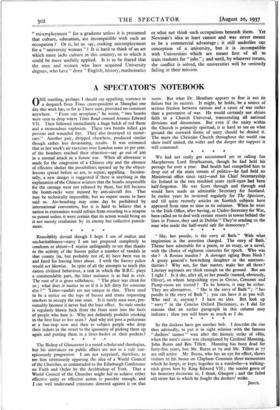The Bishop of Gloucester is a noted scholar and theologian,
but his utterances on public affairs are not as a rule con- spicuously progressive. I am not surprised, therefore, to see him strenuously opposing the idea of a World Council of the Churches, as commended to the Edinburgh Conference on Faith and Order by the Archbishop of York. That a World Council of the Churches might fail to achieve either effective unity or effective action is possible enough, and I can well understand criticisms directed against it on that score. But what Dr. Headlam appears to fear is not its failure but its success. It might, he holds, be a source of serious friction between nations and a cause of war rather than a preventive of war. He would certainly not abjure faith in a Church Universal, transcending all national divisions and dissensions. But even if the unity within the Church is primarily spiritual, it is hard to see on what ground the outward forms of unity should be denied it. The more the Christian Church throughout the world can show itself united, the wider and the deeper the support it will command.






































 Previous page
Previous page